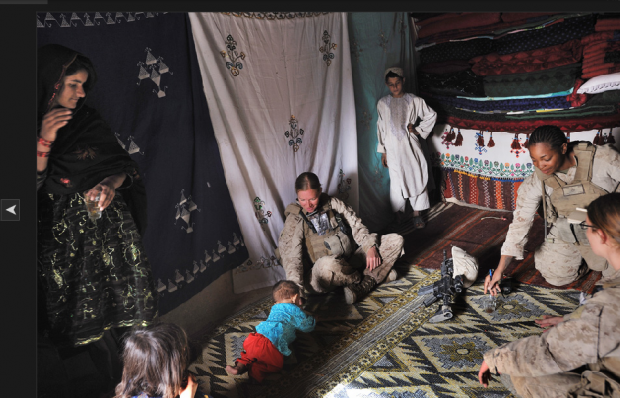Notes
Got a Tired Occupation on Your Hands? Feminize It.
The military is a brotherhood. The battlefield a cauldron of male bonding. And so it is that we are accustomed to thinking that war is men’s work. “Real” men’s work. So much so that even the thought of a homosexual in camouflage is enough to make some in the Pentagon almost apoplectic as they seek to explain the deleterious effect such “integration” would have on unit cohesion. And generally, the conventional wisdom goes, women are really no less problematic inasmuch as they create “distractions” that disrupt the fragile ecology of the band of brothers. As the photograph above suggests, however, one solution to this problem is to have all-female units, a band of sisters, as it were, who might lend a softer touch in the battle for the hearts and minds of those whose land we have chosen to occupy by military force.
This photograph leads off a slide show at the NYT titled “The Female Marines” that tells the story of a group of women warriors who have been attached to the 2nd Battalion, 6th Marine Regiment in the Helmand Province with the express purpose of “engaging” Afghani women. The assumption, apparently, is that gender trumps nationalism, and when Afghani women encounter other women they will see past their uniforms and body armor—as well as the fact that they are carrying high powered, automatic weapons—and they will identify with them as women.
The premise relies on a cultural reductionism that is altogether implausible, if not downright absurd given the circumstances of the American occupation of Afghanistan. And so one has to wonder about photographs such as this one, which show the “engagement team” sitting on the floor in an Afghani home, drinking tea and playing with a toddler while members of the family look on.
The photograph has all the qualities of a snapshot in which the principals studiously avoid acknowledging the camera so as to feign a natural or candid moment. But there is nevertheless a tension in the image that belies the illusion of a comfortable identification between the family and its “visitors.” Note, for example, how all but the toddler—who presumably has no knowledge or experience that would signal danger or caution—holds back from any direct interaction with the marines. And notice in particular the boy who stands deep in the back corner, his line of sight riveted upon the automatic weapon that sits on the rug in the middle of the floor. It is hard to know exactly what he is thinking, but it seems unlikely that he is counting his blessings that the people who have taken over his home are women and not men.
That wars such as the one we are fighting in Afghanistan are a struggle for hearts and minds is obvious, and it should give us serious pause as we continue to commit to the use of military force as a way of overcoming the influence of the Taliban in a country that has withstood occupation for centuries. But more, we need to challenge the notion that such force and occupation can be made less noxious or troublesome—let alone more successful—by trying to feminize it. In the end, female marines with guns are, well, simply marines with the guns.
(cross-posted from No Caption Needed)



Reactions
Comments Powered by Disqus